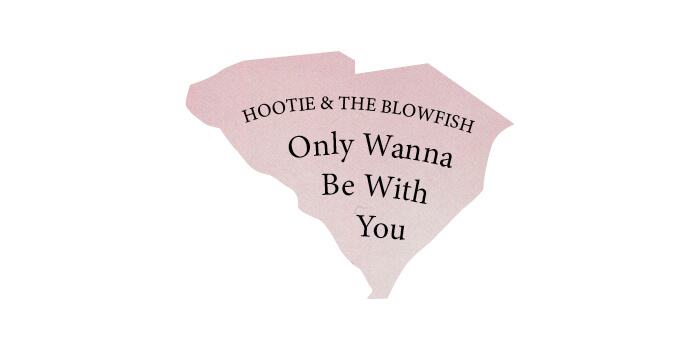Musical Map of the USA: South Carolina—Hootie & The Blowfish

Hootie and the Blowfish were never cool, exactly.
They were popular of course—their major label debut LP Cracked Rear View did Adele-like numbers, spawning four Top 20 hits and eventually selling more than 16 million copies—but it came out in 1994, the height of the grunge era. These guy wore baseball caps and cargo shorts, and the music they made was pop-rock at its most bouncy and lighthearted. This was the band of soccer moms and gateway music to frat-friendly jam bands in the Dave Matthews vein, not for any “serious” music fan.
But they were also proudly the product of South Carolina. And that was something. By the time I was getting into music in the early 2000s as a young teen living in the suburbs outside of Charleston, I was always already aware of the band’s outsized presence in my world. Everybody I knew grew up with Hootie & the Blowfish cassettes or CDs, but it never felt right to rep it—it was just a product of time and place, and the band had pretty much ceased to be a commercial or cultural force at that point.
Still, I never really disavowed the band, even as I occasionally used them as a punchline in more callow conversations of hipster one-upmanship. After all, there’s nothing particularly objectionable about the band. A bit of well goofiness sure, but there’s also so much to like about the Darius Rucker and company. They’ve been serious philanthropists, shined a light on their (and my) alma mater the University of South Carolina time and time again, and also sunk a sizable chunk of capital into trying to bring fellow local musicians along with them in the late 1990s with their Atlantic imprint Breaking Records.
And Cracked Rear View kind of holds up. If your memory of it is a toothless, bland take on roots-rock with a cynical eye towards radio, think again. These guys had a distinct identity–a Beatlesque love of sticky melodies and great harmonies, the brawny, concise power-pop riffs of guitarist Mark Bryan, and the Rucker’s inimitable voice. It’s the frontman that most defines the band now, thanks to those crazy Burger King commercials and the endless slog of a solo country career, to the point where it’s easy to forget how unique Rucker was and is.
With his gruff, Eddie Vedder-meets-Teddy Pendergrass approach to fronting an otherwise almost painfully white rock band, Rucker brought an unusual musical presence for this particular brand of pop-rock, and one that shouldn’t be discounted. The record closes with an acapella version of the gospel hymn “Motherless Child,” and it’s fifth single, “Drowning,” rails against the Confederate flag that was until-recently flying on our State House grounds. For a band and a musical culture that was otherwise stunning apolitical in the 90s, this was something, and something particularly South Carolinian.
At some point there’s probably going to be a poptimist rescue of Hootie (that’s arguably what I’m doing right now), but I feel like it’s invariably going to miss something intrinsic to why the band is so resolutely tied to my state. I think particularly of “Only Wanna Be With You,” probably the most familiar Hootie song today to most of us today, and one of its lightest. Built on that a bouncy acoustic guitar strum that reads like an amped up and blown out version of the rhythm guitar on “Tangled Up in Blue,” one of two Dylan songs that track interpolates, the song distills the three tricks the group pulls off over and over again: 1) incorporate a massive, massive hook into the chorus, 2) deliver at least one ingratiating, perhaps ill-conceived line (“even the Dolphins make me cry”), and 3) demonstrate a deeper, edgier undercurrent hiding just below the radio-ready sheen. In this case, the band should credit for cleverly inserting a verse from “Idiot Wind” into the tune–like “Tangled Up in Blue,” it’s a lesser-known album cut from Dylan’s classic Blood On The Tracks; as well as for blending subtle R.E.M. jangle pop with blockbuster beach music rhythms.
And there’s something to that mix of surface level disdain and edgy undercurrent that represents the chip on the shoulder of South Carolina. We’re both popular (tourism is our number one industry, with visitors from around the world flocking to Charleston, Hilton Head, and Myrtle Beach) and also treated somewhat derisively for our (perceived) cultural and (actual) political backwardness. Hootie’s roots-pop bloat was belied by their genuine love of classic country and 80s college rock, of taking on good-ole-boy tunes like “Family Tradition” alongside Public Enemy’s “Fight the Power” as equally legitimate cover options. This is a band that can be both bland and still surprise you, one that’s as easy to write off as it is to dig deep into its deeply ambivalent origin story. That’s South Carolina for you.
[sc name=”nattysaw6″ ]
You might also like 




















